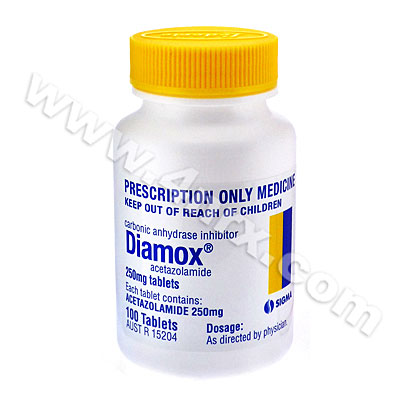 |
Home  Eyes Eyes  Diamox (Acetazolamide) Diamox (Acetazolamide) |
|
|||||||||
|
Diamox (Acetazolamide)
What is Diamox (Acetazolamide) used for? Diamox (Acetazolamide) is used to treat a wide variety of conditions, such as congestive heart failure, seizures, epilepsy, altitude sickness and open angle glaucoma. It can help to control seizures caused by epilepsy, and can reduce pressure in the eye occurring as a result of glaucoma, thereby helping to prevent the occurrence of blindness. This drug is in a class of medications known as carbonic anhydrase inhibitors, which work by reducing the activity of a protein in the body, known as carbonic anhydrase. How should I use Diamox (Acetazolamide)? Diamox (Acetazolamide) comes in the form of a tablet, which is administered orally. Patients should note that the dosage required varies considerably, depending on the specific condition being treated. Therefore, all patients must consult their physician before they take this medication, so that the precise and correct dosage required by them can be prescribed. Never exceed the dosage that you have been prescribed. What are the side effects of Diamox (Acetazolamide)? Diamox (Acetazolamide) can cause side effects, such as:
Patients should discuss the risks of all possible side effects with their physician before they start to take this medication. Consult your physician immediately if you notice unusual body hair growth, severe fatigue, persistent nausea, a rapid heartbeat, changes in mood, muscle cramps or yellowing of the eyes or skin. Please Note Strictly follow all instructions provided to you by your physician or pharmacist while using Diamox (Acetazolamide). Optimum and safe dosage can differ based on the patient and the condition being treated. As this medication may be unsafe for certain patients, it is essential you always inform your physician if you are pregnant or breastfeeding, as well as if you have any allergies, other illnesses, or ongoing health conditions, and if you are taking any other form of medication, supplements, or herbal products. Immediately seek emergency medical care if you have any allergic or hypersensitive reaction. Common signs of a reaction include hives, swelling, skin rashes, chest pains, as well as trouble breathing or swallowing. 
|
|||||||||||||||||